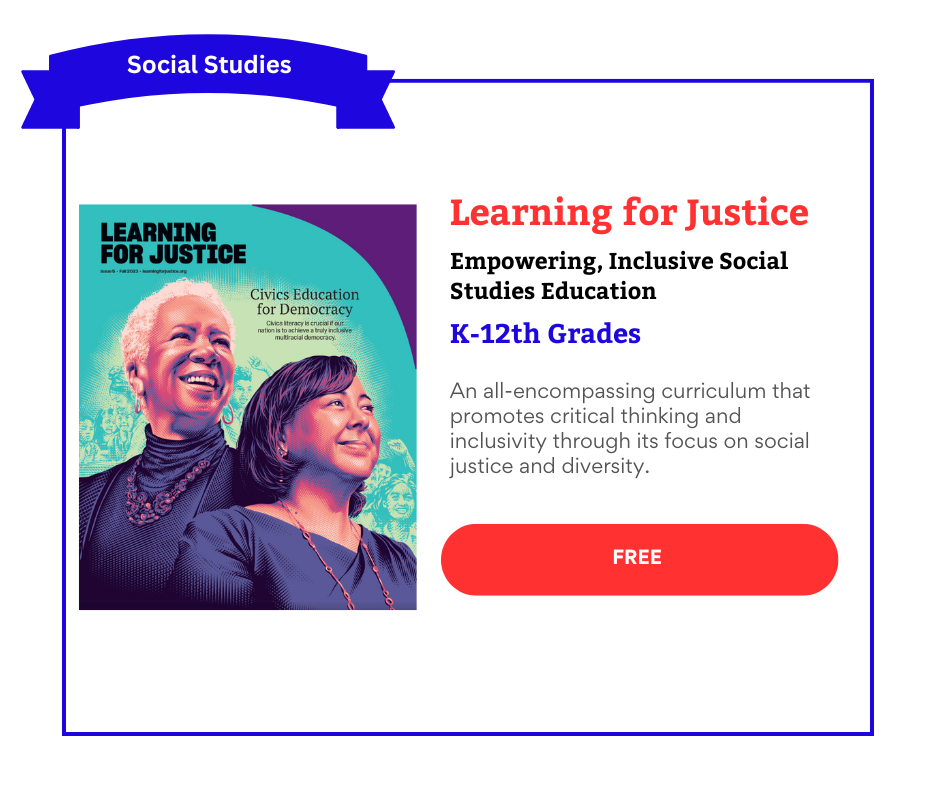iCivics
Every now and then, I find a homeschooling resource which I feel like I should be using myself. During my extensive research about sound Civics programs including reading hundreds of reviews and consulting experts, I discovered iCivics, a standout in the realm of civic education, due to its interactive, game-based approach. Created by former U.S. Supreme Court Justice Sandra Day O'Connor, iCivics has earned accolades for its innovative method of teaching government and citizenship. What I adore about iCivics is its ability to make complex concepts accessible and engaging through gameplay. It's ideal for students who thrive on interactive learning and educators who desire a comprehensive, engaging curriculum. While the need for technological access is a consideration, it doesn’t overshadow the program’s value. A pro tip for parents: actively engage with your children on the topics discussed in the games to enhance learning and retention.
Grades: 6-12th Grades. iCivics provides educational content suitable for students across various grade levels, primarily focusing on middle and high school students.
Cost: FREE. iCivics is a free resource, making it an accessible option for parents and educators looking to enrich their educational offerings without additional cost.
The in-depth review
Learning about Civics and Social Studies is fundamental to nurturing informed and active citizens. It equips students with knowledge about their government, rights, and responsibilities, fostering a sense of civic duty. When choosing a curriculum, parents should look for resources that are engaging, accurate, and comprehensive.
About iCivics
Founded in 2009 by retired U.S. Supreme Court Justice Sandra Day O’Connor, iCivics was created to reinvigorate civic education through interactive learning experiences. The platform aims to prepare students for active citizenship with its array of games and resources. It has gained recognition and accolades for its innovative approach to education and its broad adoption across the United States.
Who iCivics is for
iCivics is designed for educators and students seeking a deep, interactive approach to learning about civics. It’s especially beneficial for middle and high school students but has resources adaptable for various age groups.
Why I recommend iCivics for Civics
iCivics transforms abstract concepts into real-world applications through games and simulations. This interactive approach helps students grasp complex ideas and see the impact of civics in daily life. The comprehensive and engaging nature of the resources makes learning fun and memorable.
How iCivics works
iCivics uses games to teach topics such as the U.S. government structure, elections, civil rights, and constitutional rights. Games like "Do I Have A Right?" or "Win the White House" provide role-play scenarios that challenge students to apply their knowledge in simulated environments. The platform integrates seamlessly with tools like Google Classroom, making it easy for homeschooling parents to incorporate these resources into their teaching.
What Differentiates iCivics from other Civics programs
iCivics stands out from other civics programs primarily through its interactive, game-based learning model which was pioneered by former U.S. Supreme Court Justice Sandra Day O'Connor. This platform engages students by simulating real-world civic scenarios through over 20 different games, such as "Win the White House" and "Do I Have A Right?", making civics education both practical and immersive. Unlike more traditional, textbook-based approaches, iCivics' innovative use of digital simulations allows students to actively participate in governmental roles and legal decision-making processes. This approach is complemented by its non-partisan, factual content, which is crucial for providing balanced civic education in a polarized societal context. Additionally, iCivics maintains a commitment to accessibility and engagement for diverse learning styles and technological proficiencies, setting it apart as a leader in civic education
What iCivics covers
U.S. Government Structure: Exploring the functions and roles of different branches of government.
Elections and Voting: Teaching the electoral process and the importance of voting.
Civil Rights: Discussing historical and contemporary civil rights issues.
Constitutional Rights and Responsibilities: Understanding the U.S. Constitution and the rights it guarantees.
Legislation Process: Learning how laws are made and the role of Congress.
Presidential Responsibilities: Simulating the decision-making process of the President.
Judicial Decisions: Exploring how the Supreme Court works and its impact on American law.
Local Government: Engaging with the roles and responsibilities of local government entities.
Updates and Additions
iCivics frequently updates its offerings, including new games like "Neighborhood Good," which focuses on community problem-solving. They’ve also introduced Supreme Decision Simulations, where students role-play Supreme Court scenarios, enhancing their understanding of judicial processes.
Benefits and Drawbacks of iCivics
What Parents Like about iCivics
Engaging and Interactive: iCivics games are praised for their ability to engage students in civics topics in a compelling and interactive way, making learning fun and accessible.
Wide Range of Topics: The platform covers a broad spectrum of civics-related content, including the branches of government, elections, and rights, providing comprehensive learning opportunities.
Free and Accessible: As a free resource, iCivics is highly accessible to schools and individual learners, making it an excellent tool for educators on a budget.
Supports Group and Individual Learning: The games are designed to be flexible, supporting both group and individual learning environments, which can be tailored to classroom periods.
Realistic Complexity: The games introduce students to the complexities of policies and legislative processes, enhancing their understanding and interest in real-world issues.
Caters to homeschoolers: There’s an entire section on the site devoted to how iCivics can support homeschooling families.
What parents dislike
May Not Replace Traditional Learning: While iCivics is a valuable supplementary tool, some educators feel that it should not replace traditional learning methods but rather enhance existing curricula.
Technology Dependency: The effectiveness of iCivics depends on the availability of technology in classrooms, which might be a limiting factor in under-resourced schools.
Special Needs
Autism: iCivics' structured, clear, and visually engaging interface can help students on the autism spectrum who often benefit from consistent and predictable learning environments. The interactive games might also help in maintaining focus and engagement through their visually stimulating content.
ADHD: The interactive and game-based nature of iCivics is beneficial for students with ADHD by providing immediate feedback and continuous engagement. Games that require quick decision-making and problem-solving can help in maintaining attention and reducing distractions.
Dyslexia and Dysgraphia: Although not specifically designed for dyslexia or dysgraphia, the multimedia format of iCivics, which includes videos and interactive content, can help reduce the reliance on heavy text-based learning, which is often a challenge for students with these learning disabilities.
Gifted and 2e (Twice Exceptional): Gifted and twice-exceptional students often seek deeper knowledge and creative outlets for learning. iCivics' complex simulation games that involve strategy, critical thinking, and problem-solving cater to these needs by challenging them intellectually and allowing for an exploration of civics in a multifaceted manner.
Tips from Parents on how to get the most out of iCivics
To maximize the benefits of iCivics, parents recommend actively discussing the game scenarios with children, relating them to current events or historical precedents. This helps reinforce learning and encourages critical thinking.
Select Reviews from Parents and Teachers
"The engaging games... keep kids playing and figuring out their concepts. My students especially enjoyed 'Do I Have a Right?', 'Branches of Power', 'Immigration Nation', and 'Power Play'." — MiddleWeb Review
"iCivics... provides engaging and interactive ways to learn about the government. My students find the platform informative and enjoyable, making it easier to teach complex civics topics." — Common Sense Education Review
"While the content is fantastic, I sometimes wish there were more in-depth options for older or more advanced students." — Edutopia Review
"iCivics has helped my child understand her rights and responsibilities as a citizen much better than traditional teaching methods." — Parent Feedback, TeachersPayTeachers
"As an educator in a low-resource school, I appreciate the free access to high-quality educational games, but I struggle with ensuring all students can participate due to limited computer access." — Tech & Learning Review
Why Trust Me
With over 20 years of experience teaching Civics and Social Studies across different educational settings and regions, I bring a depth of understanding and a unique perspective to evaluating educational resources. My background ensures a well-rounded review based on extensive research and firsthand usage of iCivics.
How I Vetted
This review is based on thorough research, including reading hundreds of reviews, consulting with educators, and directly engaging with iCivics resources. This comprehensive approach ensures an informed and balanced review.
What I Looked For and How iCivics Stacks Up
Comprehensive: iCivics offers a broad range of civics topics, covering government structures, elections, rights, and more, providing a thorough understanding of U.S. civics.
Secular: The platform maintains a non-partisan, secular approach to civics education.
Accurate: iCivics is known for its factual content that aligns with historical and governmental accuracy.
Decolonized: There is no specific mention of a decolonized perspective in the standard curriculum.
Inclusive and Anti-racist: iCivics aims to be inclusive, though specific mentions of anti-racist content are not highlighted in the general reviews.
Mastery-based: The games and simulations allow students to progress at their own pace, supporting mastery-based learning.
Aligned with School Standards for Civics: iCivics aligns with national and state standards for civics education.
Fun and Engaging for Kids: The platform is highly praised for its interactive games and engaging content that make learning civics fun for students.
The Bottom Line
Who is iCivics an ideal fit for?
iCivics is ideal for students who thrive on interactive learning and parents/educators who want a comprehensive, engaging curriculum that covers a wide range of civics topics. It supports critical thinking and active engagement in learning.
Who is iCivics not a fit for?
While iCivics is highly beneficial, it may be less suitable for younger children without adaptation or for settings where internet access is limited, as most resources are online.
Alternatives and supplements to iCivics
For a comprehensive world Social Studies curriculum: Curiosity Chronicles offers an extensive curriculum covering global history and cultures, providing a broad perspective beyond U.S. civics.
For a YouTube channel: Crash Course U.S. Government and Politics is a popular choice, offering engaging and informative videos on American government and political concepts.
For a free full Social Studies curriculum: Digital Inquiry Group (formerly known as the Stanford Social Studies Education Group) provides a wealth of resources for deepening understanding of historical and contemporary social issues.
For a book series: The Revisioning History for Young People Series is a collection of books that presents U.S. history from diverse perspectives, encouraging critical thinking and inclusivity in historical interpretation.
Value for the Money
Given that iCivics is free, it offers exceptional value. It provides a rich array of educational resources without the financial investment typically associated with comprehensive educational platforms.
Ways to Get iCivics
iCivics can be accessed directly through its website iCivics.org. Registration is straightforward, allowing parents, educators, and students to utilize the resources immediately.
Affilate Disclaimer
This review is unbiased and independent; I may earn a commission from purchases made through links included in the review. However, no direct affiliation influences the insights and recommendations provided here.


Explore our comprehensive review of iCivics, a free educational platform that transforms civics learning through interactive games and simulations. Designed for middle and high school students, iCivics makes understanding government engaging and accessible.